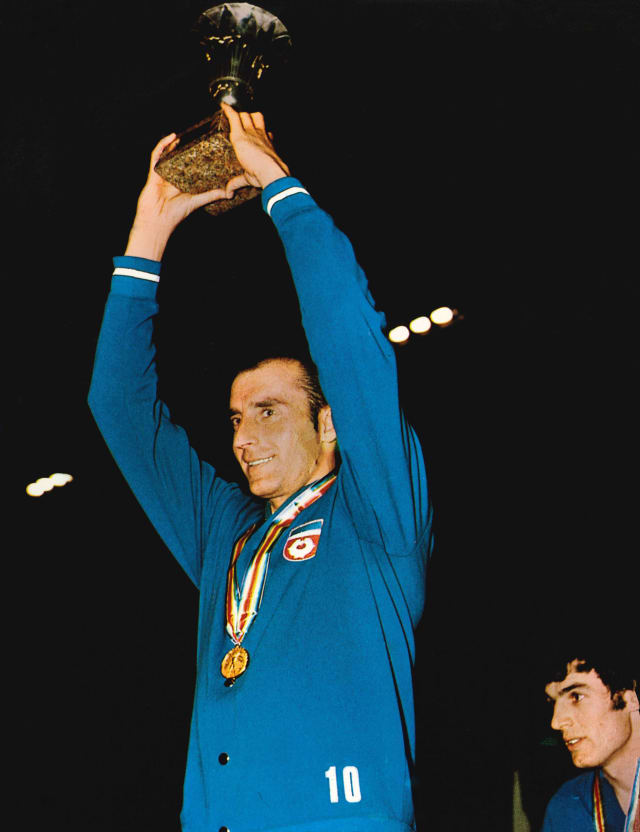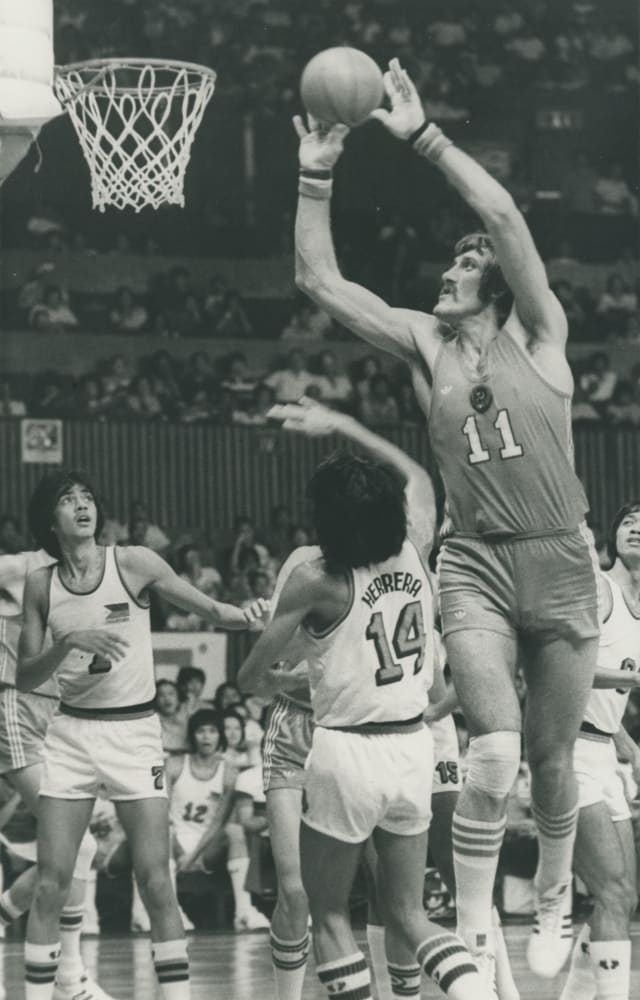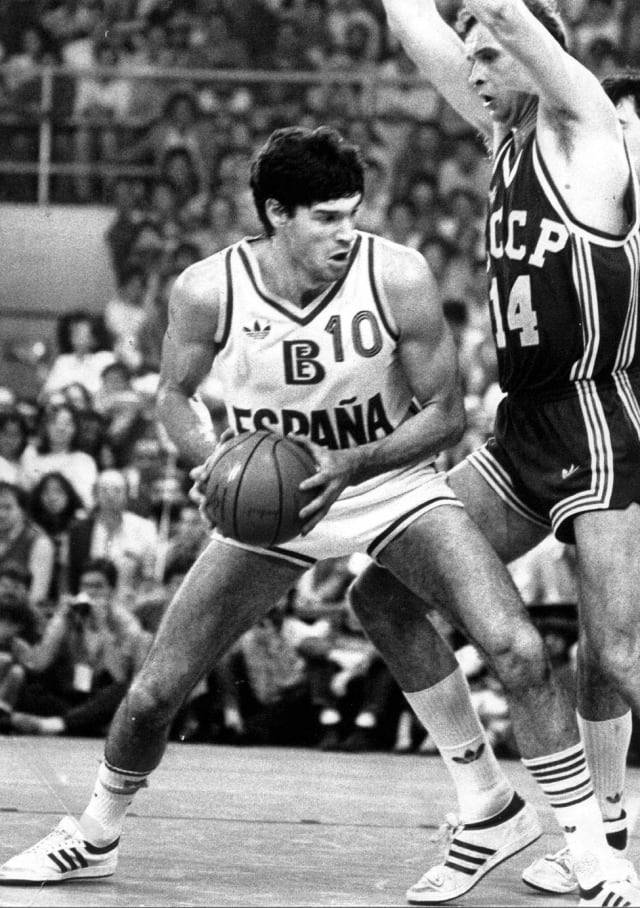FIBA Basketball World Cup Top 100 scorers: 100-76
We look back at the top 100 scorers in FIBA Basketball World Cup history, starting with positions 100-76.
MIES (Switzerland) - We have reached the 100-day mark in the countdown for the FIBA Basketball World Cup 2023. To commemorate the occasion, there's no better time to remember the top 100 scorers in competition history.
Divided into four segments of 25 players each, the series starts on Thursday, May 18.
100. Boris DIAW
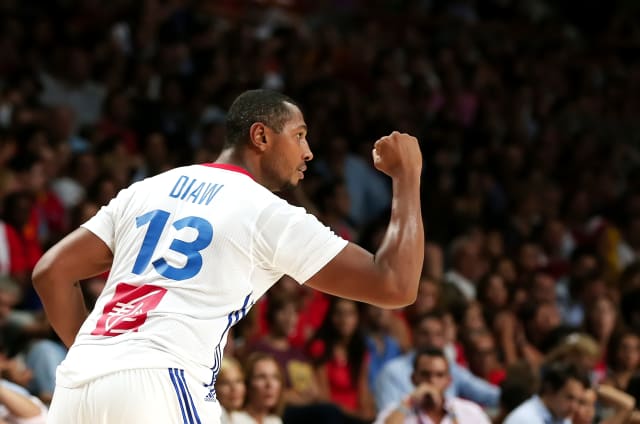
POWER FORWARD
Birth date: 16/04/1982
Points: 241
Games played: 24
Participations: 3 (2006, 2010, 2014)
Medals: 1 🥉(2014)
Diaw was a leading player for France from 2003 until his retirement from the national team in 2018. He played in three World Cups, his latest in 2014 when he helped France reach the podium for the first time as the team captain. Diaw averaged 11.9 points per game in 2006 followed by 8.5 points in 2010 and 9.2 points four years later.
99. Ivo DANEU
GUARD
Birth date: 06/10/1937
Points: 230
Games played: 22
Participations: 3 (1963, 1967, 1970)
Medals: 🥇(1970), 🥈(1963, 1967)
Daneu made three consecutive World Cup appearances and he guided Yugoslavia to medals in each edition. After finishing second in 1963 and 1967, the Hall of Famer captained the Yugoslavia team to their first world title in 1970 - in his hometown of Ljubljana as Yugoslavia were hosting the event. Daneu was the second-best scorer for his country in 1967, averaging 14.0 points per game and winning the MVP award.
98. Alex GARCIA
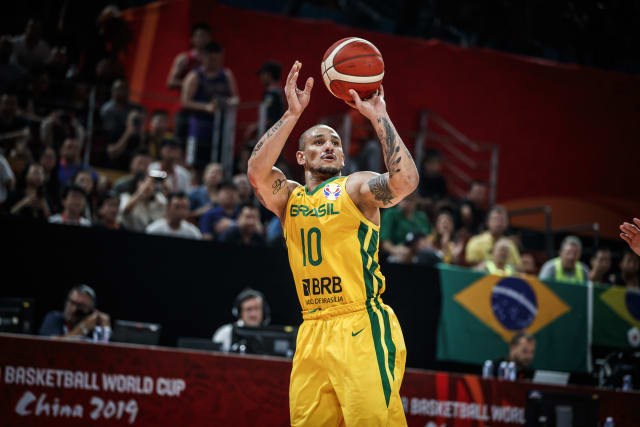
GUARD
Birth date: 04/03/1980
Points: 242
Games played: 32
Participations: 5 (2002, 2006, 2010, 2014, 2019)
Medals: 0
Garcia was a pillar of the Brazilian national team for nearly two decades, playing in five World Cups from 2002 to 2019 - having turned 39 years old before China 2019. Garcia averaged at least 7.7 points per game in the final four tournaments, with his top output being 10.0 points per contest in 2019.
97. Pedro CHAPPE
FORWARD
Birth date: 16/06/1945
Died: 15/05/2003
Points: 242
Games played: 17
Participations: 2 (1970, 1974)
Medals: 0
Chappe played a major role in Cuba's excellence in their most prevalent time in international basketball. In addition to playing at three Olympics, he appeared in the country's first two World Cups in 1970 and 1974. Chappe led Cuba in scoring in 1970 (17.9 ppg) and then picked up 11.0 points per game as Cuba finished fourth in 1974 - the nation's best performance at the World Cup, which came two years after Cuba took bronze at the 1972 Olympics.
96. Shane HEAL
GUARD
Birth date: 06/09/1970
Points: 242
Games played: 16
Participations: 2 (1994, 1998)
Medals: 0
Heal appeared on the World Cup stage twice and both times was a key player for Australia. He ranked second on the team in scoring in 1994 and then was the fourth-best scorer of the 1998 World Cup with 17.0 points per game. Heal scored 31 points against USA in the final Second Round game.
95. Tiago SPLITTER
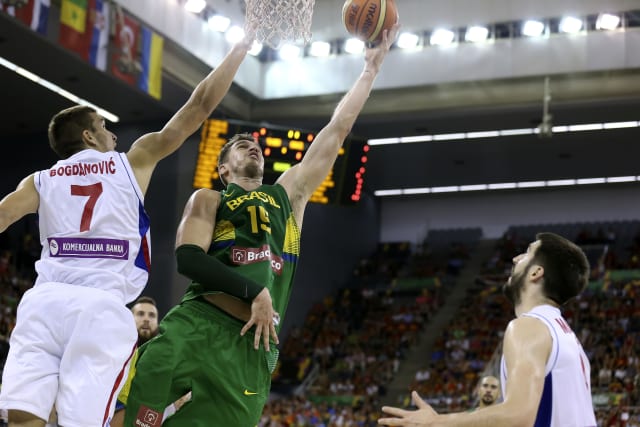
CENTER
Birth date: 01/01/1985
Points: 243
Games played: 26
Participations: 4 (2002, 2006, 2010, 2014)
Medals: 0
Splitter was only 17 years old when he debuted at the World Cup in 2002 - his first of four World Cup appearances. The center became a leader in 2006 and poured in 16.4 points per game and averaged 12.8 points in 2010. Splitter still contributed 7.6 points in 2014.
94. Valdis VALTERS
GUARD
Birth date: 04/08/1957
Points: 243
Games played: 19
Participations: 2 (1982, 1986)
Medals: 🥇(1982), 🥈(1986)
Valters arrived at the 1982 World Cup after having been named the MVP of the FIBA EuroBasket 1981 for Soviet Union. And the Latvian ranked third in scoring for the Soviets in 1982, helping them win the title with 14.0 points per game. Valters tallied 12.8 points per game in 1986 as Soviet Union took second place.
93. Serguei BABKOV
GUARD
Birth date: 05/06/1957
Points: 243
Games played: 17
Participations: 2 (1994, 1998)
Medals: 🥈(1994, 1998)
Babkov featured at two World Cups for Russia and came up just one step short both times with with runners-up finishes in 1994 and 1998. Babkov scored 15.3 points per game in 1994 but his game-high 22 points in the Final against USA were not enough. Four years later he scored 30 points to help Russia beat USA in the Semi-Finals, but Babkov and co. lost to Yugoslavia in the title bout.
92. Vladimir TKATCHENKO
CENTER
Birth date: 20/09/1957
Points: 244
Games played: 21
Participations: 3 (1978, 1982, 1986)
Medals: 🥇(1982), 🥈(1978, 1986)
Tkatchenko was a major part of Soviet Union's success in Europe and the world for more than a decade. The giant patrolled the paint in winning the World Cup crown in 1982 and taking second place in his other two appearances in 1978 and 1986. The three-time European champion and future FIBA Hall of Famer led Soviet Union in scoring in 1978 at 14.5 points per game only to see his team-high 14 points not be enough in an 82-81 loss in the Final to Yugoslavia. He was named to the All-Tournament Team in 1978 and 1982.
91. Stanislav KROPILAK
POWER FORWARD / CENTER
Birth date: 10/06/195
Died: 14/10/2022
Points: 244
Games played: 14
Participations: 2 (1978, 1982)
Medals: 0
Kropilak represented Czechoslovakia for more than a decade and appeared in two World Cups. He ranked second on the team in scoring in 1978 with 15.6 points per contest and topped the country's scoring list in 1982 with 19.3 points per game. The future FIBA Hall of Famer was recognized as the best Slovakian player of the 20th century.
90. Renzo BARIVIERA
FORWARD
Birth date: 26/02/1949
Points: 246
Games played: 19
Participations: 2 (1970, 1978)
Medals: 0
Bariviera played in two World Cups and both times came up just short of a medal - taking fourth place in 1970 and 1978. He averaged 9.8 points as Italy lost to Soviet Union in the 1970 third-place game. Bariviera poured in a team-high 15.8 points per game in 1978 and he had 21 points in the third-place game but Italy lost 86-85 to Brazil on a buzzer-beater.
89. Alexandr SALNIKOV
FORWARD
Birth date: 03/07/1949
Died: 17/11/2017
Points: 246
Games played: 17
Participations: 2 (1974, 1978,)
Medals: 🥇(1974), 🥈(1978)
Salnikov was one of the best shooters in Soviet basketball and he played at two World Cups - 1974 and 1978. He led the Soviet Union in scoring in 1974 at 17.6 points per game including scoring 38 points in the decisive final game against USA to win the title. Salnikov picked up 11.0 points per game in 1978 and took home a silver medal from the Philippines.
88. Carlos QUINTANAR
FORWARD
Birth date: 02/06/1937
Died: 14/10/2010
Points: 247
Games played: 22
Participations: 3 (1959, 1963, 1967)
Medals: 0
Quintanar played in three consecutive World Cups - 1959, 1963 and 1967. He was the country's second-leading scorer in the first two tournaments - with 11.3 and 14.8 points, respectively. The former national team captain added 7.6 points per game in 1967.
87. Dejan BODIROGA
FORWARD
Birth date: 02/03/1973
Points: 248
Games played: 18
Participations: 2 (1998, 2002)
Medals: 🥇(1998, 2002)
Bodiroga was a perfect two-for-two as the forward played in two World Cups and twice won the title. He led Yugoslavia in scoring in 1998 with 14.7 points, including 31 points against Greece in the Semi-Finals. Bodiroga was named MVP of the World Cup that year. In 2002, he finished with 12.9 points per game, saving his best for the end, pouring in 27 points in the Final against Argentina.
86. Rolando FRAZER
POWER FORWARD / CENTER
Birth date: 03/07/1958
Points: 250
Games played: 11
Participations: 2 (1982, 1986)
Medals: 0
Frazer helped Panama reach two World Cups and was a scoring force in both tournaments. He led the 1982 World Cup in scoring with 24.4 points per game, topping out with 31 points against China. Frazer poured in 19.8 points per game four years later, including 35 points against Korea.
85. Anderson VAREJAO
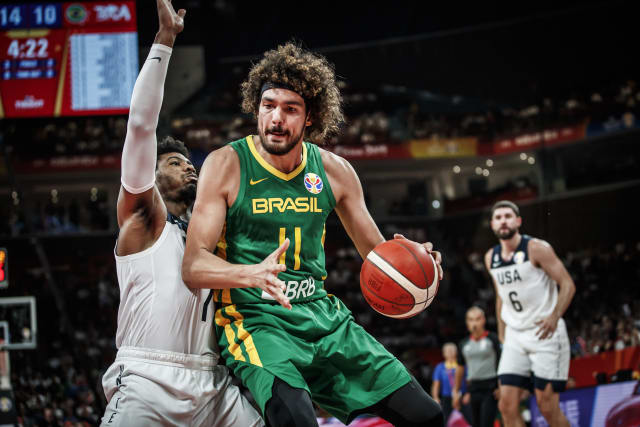
CENTER
Birth date: 28/09/1982
Points: 252
Games played: 29
Participations: 5 (2002, 2006, 2010, 2014, 2019)
Medals: 0
Varejao was a rock for the Brazilian national team over nearly two decades, playing five straight World Cups from 2002 to 2019. The center was a month shy of his 20th birthday when debuted on the global stage in 2002, averaging 9.2 points. Varejao followed that with 9.0 points in 2006, 4.3 points in 2010, 8.7 points in 2014, and then a World Cup best 10.0 points in China 2019 - as a 36-year-old veteran.
84. Raymond DALMAU
POWER FORWARD
Birth date: 27/10/1948
Points: 253
Games played: 21
Participations: 2 (1974, 1978)
Medals: 0
Dalmau appeared in two World Cups - in 1974 and 1978 - in addition to three times playing in the Olympics. He scored 9.7 points in his first World Cup and then ranked third on Puerto Rico in scoring in 1978 with 13.4 points per game.
83. Marcelo NICOLA
POWER FORWARD
Birth date: 12/05/1971
Points: 253
Games played: 17
Participations: 2 (1994, 1998)
Medals: 0
Nicola competed in two World Cups - in 1994 and 1998 - the latter coming with the next generation of Argentina superstars including Luis Scola, Manu Ginobili, and Pepe Sanchez. Nicola led the team in scoring in 1994 with 17.8 points per game, including two 25-point outputs. In 1998, the power forward contributed 12.3 points, topped by 30 points against USA.
82. Omar ARRESTIA
FORWARD
Birth date: 12/05/1947
Died: 15/03/2009
Points: 254
Games played: 15
Participations: 2 (1967, 1970)
Medals: 0
Arrestia was one of Uruguay's greatest players ever produced, participating in two World Cups - in 1967 and 1970. In his first global competition at home, 'Chumbo' ranked second on the team in scoring with 12.8 points. Arrestia increased that average to 19.7 points per game in 1970, ranking second in the competition. He opened the 1970 World Cup with 40 points against United Arab Republic.
81. Juan Alberto ESPIL
GUARD / FORWARD
Birth date: 05/01/1968
Points: 255
Games played: 17
Participations: 2 (1994, 1998)
Medals: 0
Espil featured in two World Cups - in 1994 and 1998. The wing ranked second in scoring for Argentina in 1994 with 16.0 points per game. Four years later, Espil averaged 14.1 points per game to lead an Argentina team that also included Luis Scola, Fabricio Oberto, Manu Ginobili, Pepe Sanchez and Marcelo Nicola.
80. Fernando MARTIN
CENTER
Birth date: 25/03/1962
Died: 03/12/1989
Points: 256
Games played: 18
Participations: 2 (1982, 1986)
Medals: 0
Martin was considered one of the greatest players in Spanish history but the center passed away in car accident in 1989 at just 27 years of age. He played in two World Cups, making his debut in 1982 at just 19 years old. Still, he poured in 13.1 points per game, including 24 points against USA and 21 versus Yugoslavia. Four years later, the FIBA Hall of Famer was second on Spain's team in scoring with 15.3 points per game.
79. Nicolas BATUM
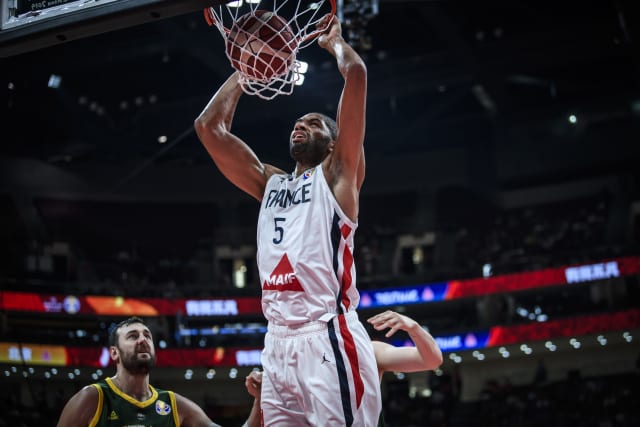
FORWARD
Birth date: 14/12/1988
Points: 257
Games played: 22
Participations: 3 (2010, 2014, 2019)
Medals: 2 🥉(2014, 2019)
Batum has been a leader of the French national team for more than a decade, appearing in three World Cups from 2010 to 2019. After leading France in scoring in 2010 with 12.5 points per game, Batum topped the team in scoring in 2014 with 14.6 points per game, including 35 points in the Semi-Finals and 27 points in the Third Place Game. Batum chipped in 7.3 points per game in 2019.
78. Fadi EL KHATIB
FORWARD
Birth date: 18/12/1979
Points: 259
Games played: 15
Participations: 3 (2002, 2006, 2010)
Medals: 0
El Khatib is one of the legends in Lebanese basketball history, playing a major role in helping the country reach three straight World Cups from 2002 to 2010. He led Lebanon in scoring in all three World Cups. In 2002, he averaged 17.6 points per game followed by 18.8 points per game in 2006, including 35 points against Venezuela in Lebanon's opening game and 29 points versus France. El Khatib had 15.4 points per game in 2010, topped by 31 in the opener against Canada.
77. Panagiotis FASOULAS
CENTER
Birth date: 12/05/1963
Points: 260
Games played: 25
Participations: 3 (1990, 1994, 1998)
Medals: 0
Fasoulas featured for Greece in three World Cup appearances from 1990 to 1998, coming up just short of a medal in 1994 and 1998 with fourth placed finishes. The FIBA Hall of Famer averaged 11.9 points per game in 1990 and followed that with a team-high 14.1 points per game in 1994. Four years later, at age 35, Fasoulas contributed 5.8 points per game.
76. Jean-Jaques CONCEICAO
POWER FORWARD
Birth date: 03/04/1964
Points: 260
Games played: 18
Participations: 3 (1986, 1990, 1994)
Medals: 0
Conceicao is one of the greatest players in Angolan history, playing at three consecutive World Cups from 1986 to 1994 and helping the country with seven FIBA AfroBasket titles. The FIBA Hall of Famer led Angola in scoring in 1986 (17.3 ppg) and 1990 (18.0 ppg) and tallied 7.8 points per game in 1994.
Next time, we will take a look at positions 75-51 in the FIBA Basketball World Cup Top 100 scorers list.
FIBA
